-
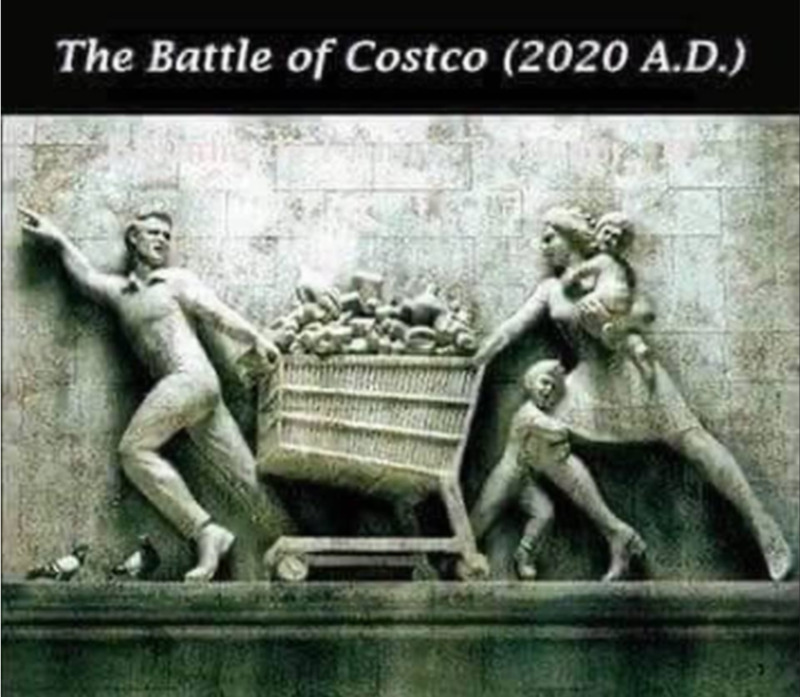
2020-03-25
HIST30060 - submitted as part of a history assignment. Again, like many other memes I encountered, this one comments on how the events of this year will be studied, but more importantly how they will be remembered (as emphasised by the almost commemorative nature of the statues). Humorously depicting parents and two children racing with an overflowing trolley full of food toward the check-outs as though it were a battle scene, this meme seeks to ridicule the absurdity of purchasing and hoarding mountains of food during the lock-down period. It suggests that violence in the isles and the toilet paper crisis that saw people literally fighting each other in order to obtain toilet paper will not be looked upon favourably by future historians or students. The way that the figures are carved in stone and the title of ‘The Battle of Costco (2020 A.D.)’ positions the audience to view the image in reference to other major historical conflicts and to find this one, humorously, falling short.
-
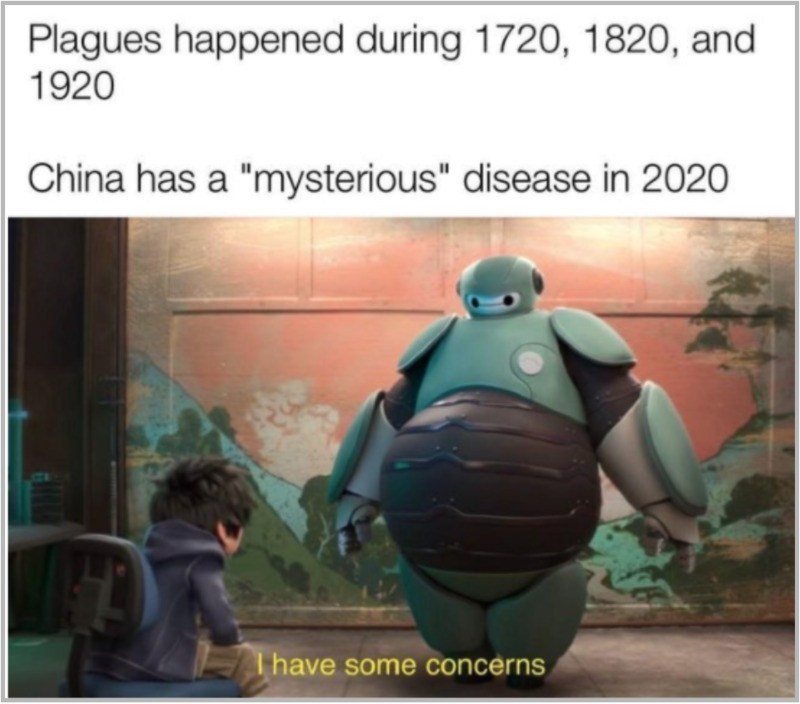
2020-11-10
HIST30060 - submitted as part of a history assessment. Many of the memes, like this one, comment on the cyclical nature of history and the inescapability of the repetition of disasters. By drawing attention to other plagues of the past - all of which occurred during the 20s of their respective centuries - the image preempts the current ‘plague’ or pandemic. The accompanying image taken from the 2014 film ‘Big Hero 6’ and the comment ‘I have some concerns’ (an understatement to say the least) add an amusing note to the alarming message. Much of the humour found in these memes and images contained words ‘read’ in a deadpan or resigned tone - or otherwise the voice of one who is no longer surprised by the current turn of events. Again, there is a resounding feeling that this year has been a strain as one disaster after another occurs.
-
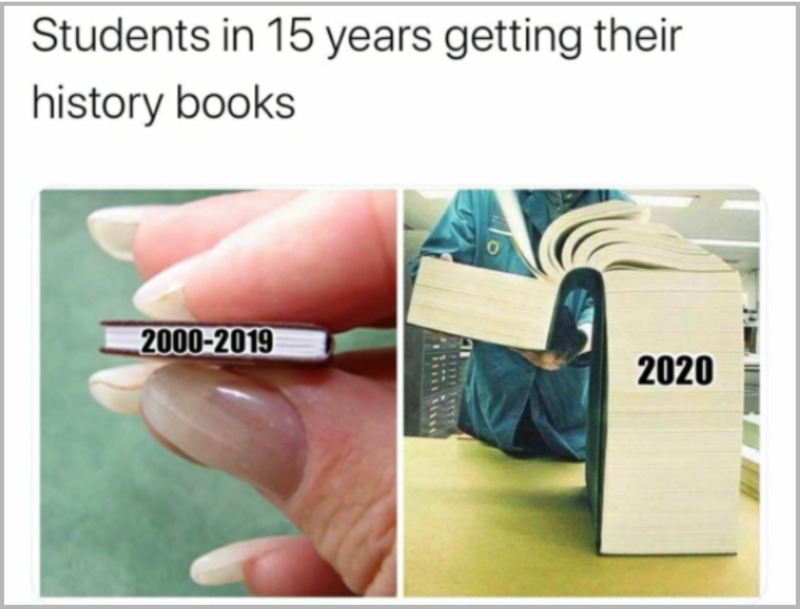
2020-05-31
HIST30060 - submitted as part of an assessment for a history subject. A significant number of the memes I found commented on the incredible number of ‘disasters’ or disruptions that have had a global impact this year (suggesting that this number is far more than anything to occur in the last decade). The disasters referenced in these memes concern a range of instances including the Australian Bushfires, the “threat of World War III” (with the assassination of Iranian General Qasem Soleimani by drone strike), the Covid-19 pandemic, the American Murder Hornets, the explosion in Beirut and the American bushfires. The ‘disasters’ or global events that feature in the memes span almost every continent and every sphere from environmental (e.g. the bushfires), the social (e.g. the American race riots), the economic, the political (e.g. the explosion in Beirut and subsequent investigation into corruption) and health (e.g. the pandemic). This particular meme suggests that the study of this year will be an arduous task for history students of the future.
-
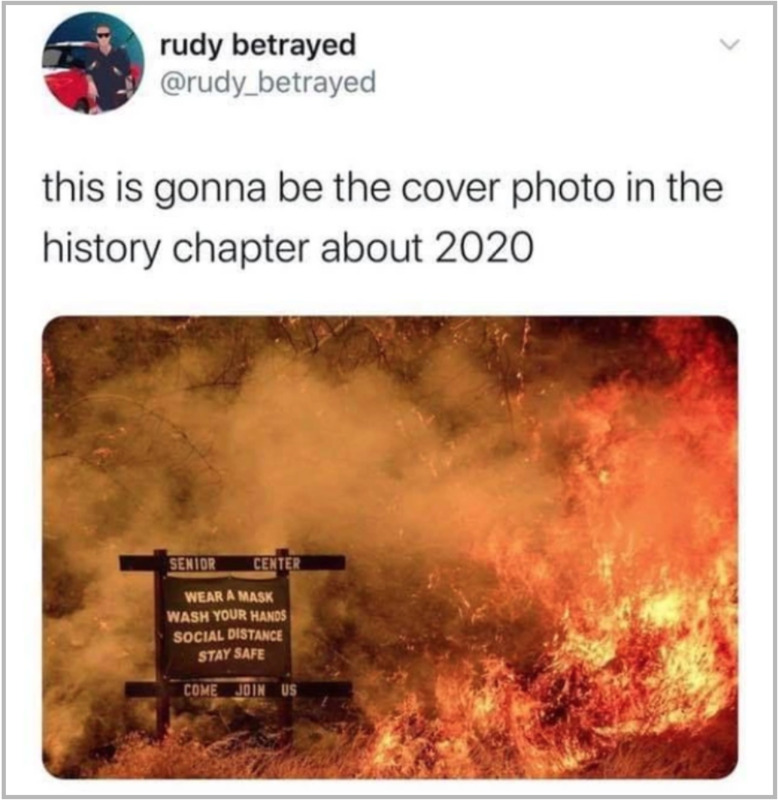
2020-08-26
HIST30060 - submitted as part of history assessment. This tweet produced in August 2020 includes a photograph of the American bushfires with the caption ‘this is gonna be the cover photo in the history chapter about 2020’. Like so many other memes and tweets, this item points to the cumulative nature of the disastrous events of 2020, suggesting that the entire year can be summarised by a hellish scene of a large fire devouring all its path while a sign warns of precautions needed to protect from covid-19. The tweet also draws attention to the study of history and how future generations of historians (and school students) will be introduced to the major events of the year.
-
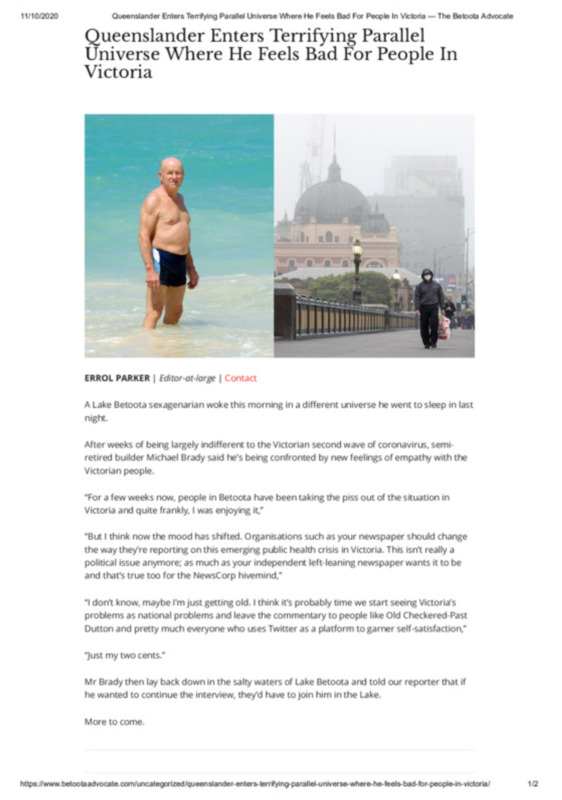
2020-07-30
This satirical article by the Betoota Advocate is a social commentary on varying experiences of the coronavirus pandemic in different Australian states, specifically Victoria and Queensland, which speaks to my own experiences as someone who has lived in both states during Melbourne's second lockdown from July. The article mentions the general indifference or lack of sympathy towards Victorians, as NewsCorp and the general public have seen the second wave of cases in the southern state as being their own fault. This is something I noticed upon my return to Queensland in August, where the general rhetoric surrounding Victoria and their Premier Daniel Andrews' handling of the high number of cases in the state tended to be divisive. I had never heard of the term 'Dictator Dan' before returning to Queensland and people I knew were calling Victorians 'Mexicans', which I put down to the monopolisation that Murdoch media has over Queensland news. I saw these sentiments turn to sympathy as stage 4 lockdown set in, as Queenslanders realised the negative effects lockdown was having on Victorians. This also differed from the indifference I noticed when I first came back to Queensland, where most people seemed to have forgotten what lockdown was like and were living like everything was back-to-normal. As someone who experienced both lockdowns in Melbourne, as well as relatively normal life in Queensland, I definitely did not take the ability to travel, go out and see friends and family for granted, whilst also retaining deep sympathy towards everyone still in lockdown in Melbourne (which included many of my friends and some family).
HIST30060.
-
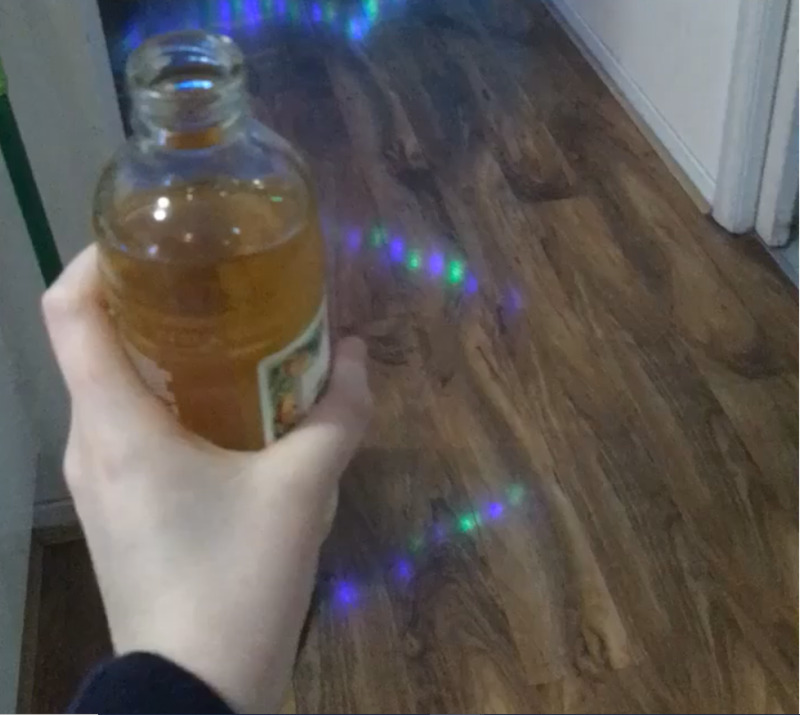
2020-08-01
During lockdown my group of friends stayed close through sharing videos and memes on facebook and participating in tiktok trends. We had a weekly zoom set up with people from Melbourne and Geelong where we’d talk about our mostly uneventful weeks, gossip about uni and celebrity news and little bit about Dan Andrews or as he was lovingly known Daddy Dan/Dandrews. Regularly having a zoom call was a comforting experience because before the pandemic we stayed in contact mostly by planning parties and lunches. The pandemic definitely made us closer through creating group chats and organising to play a game together, usually Among Us on Wednesday night. This post includes the tiktok beveragino trend where people have drinks with their mates and film them popping out from random locations. HIST30060
-
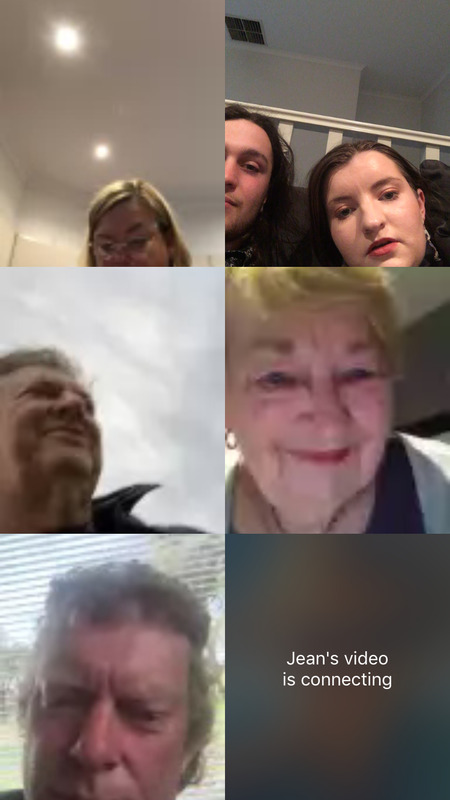
2020-04
At the start of lockdown it became clear that my family would not be able to see each other for a while. Most of my family lives in Sydney, some of us live in Melbourne, regional Victoria and Canada. In response, my sister initiated a Coffey Family FaceTime every night at 6:30pm with whoever was available. However, this meant teaching my grandmothers how to use Facebook and how to start a call. More than 8 months later and both my grandmothers still can’t turn their video on without direction and also can’t start Facebook calls. This call kept us together when we felt far away. Celebrating father’s day and birthdays and anniversaries on FaceTime made some moments more memorable and some feel more lonely. Face timing each other was fun until there was a family dinner in Sydney and you couldn’t leave the state. However, there were fun moments, stirring up my parents dogs by yelling “walkies” or “dindins” and then leaving the call, FaceTiming on empty trams and using the weird face effects to confuse my grandmother about who’s camera was whose. The call gave structure to the days spent inside and caused me to talk to my grandmothers and extended family more about the current world events. HIST30060
-
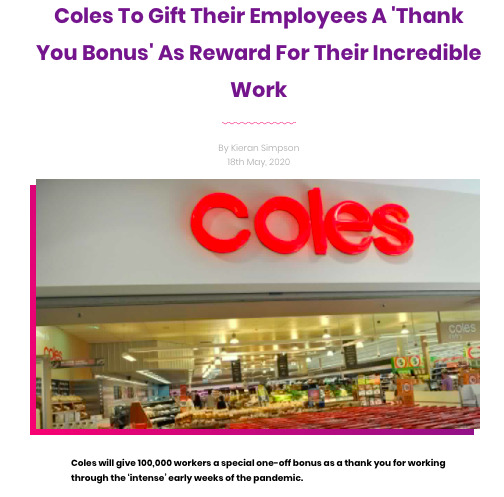
2020-05-18
Throughout the pandemic I worked in a bottle shop owned by Coles in South Melbourne. Sales increased dramatically during the pandemic for two reasons. Firstly, people were worried about Dan Andrews closing bottle shops during lockdown. Secondly, because bars and venues were closing, people had to source their own alcohol. During the interim period when people were discussing what the stage 3 and 4 lockdown would look like customers would come into the shop and ask if we were considered an ‘essential service’. I would respond with “I assume we’re considered essential,” “how would you survive without booze?” and “you’d know more than we do.” During this period of time it seemed like everyone knew a friend or an acquaintance of a friend who was in politics and sharing information about COVID lockdown meetings and what the next stage would involve. The uncertainty of not knowing if I’d be working next week was stressful and caused anxiety and it also caused me to panic buy wine (most of which was not touched). Nonetheless, we stayed open throughout all lockdowns and acquired new customers. During lockdown our sales increased on cocktail ingredients such as triple sec and campari because people started making cocktails at home. During the pandemic customers seemed to have more time to chat and browse and wanted to try new products. but this could also be because they liked the excuse to stay out of home for longer. As well, Coles gave employees who worked from March to May 2020 a one-off thank you bonus for working during the hardest weeks of the pandemic. Working during a pandemic had highs and lows, I was grateful that I didn’t live with my family, so I couldn’t bring home to virus, but it was hard juggling extra hours at work around online uni and other aspects of life. HIST30060
-
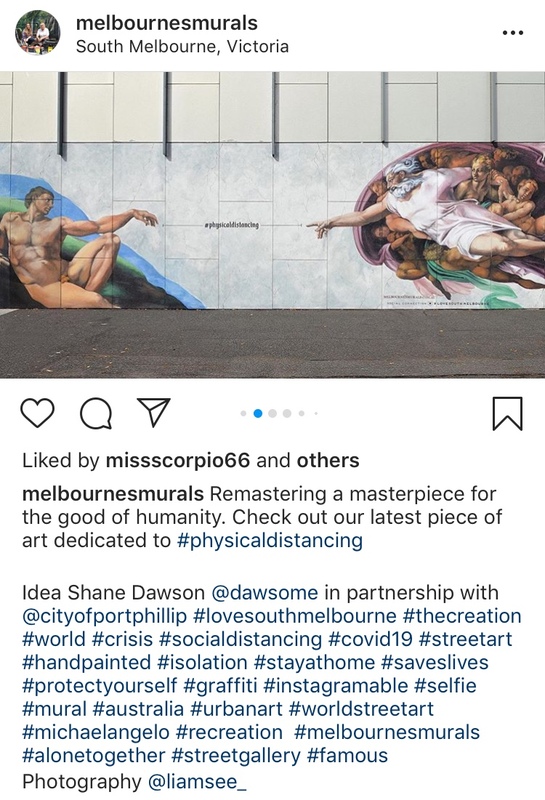
2020-05-01
Outside my work the council of Port Phillip commissioned an artwork on Coventry Street South Melbourne by Bridgette Dawson who goes by Melbourne Murals. She remastered the renaissance creation of Adam masterpiece dedicating the work to physical distancing. This piece developed throughout March when social distancing was fairly new and the mural demonstrates the way social distancing impacted everyday life. During this period the council of Port Phillip organised an initiative for property owners to register their buildings to have murals painted on the exterior. This would give artists work during a hard financial time and would deter graffiti. Port Phillip council also created a map for viewing their new street art installations, encouraging new walking paths when life seemed on repeat. I see this artwork nearly everyday and customers continually comment on it and smile about it. It’s a reflection of how COVID changed our lives and the spaces around us in South Melbourne.
-
2020-05-01
During the first lockdown in Melbourne the community in Southbank bonded through new COVID influenced street art. On the side of my apartment building on City Road, Southbank street artist Peter Seaton also known as CTO Art was commissioned to paint a piece over some recent graffiti. He titled the street art ‘trapped in a third dimension’, he described that COVID19 had caused fear and panic, which are the lowest emotions and he wanted people to experience and remember the feeling of love. This painting reflects intimacy during coronavirus and ideas of not being able to touch one another.
-
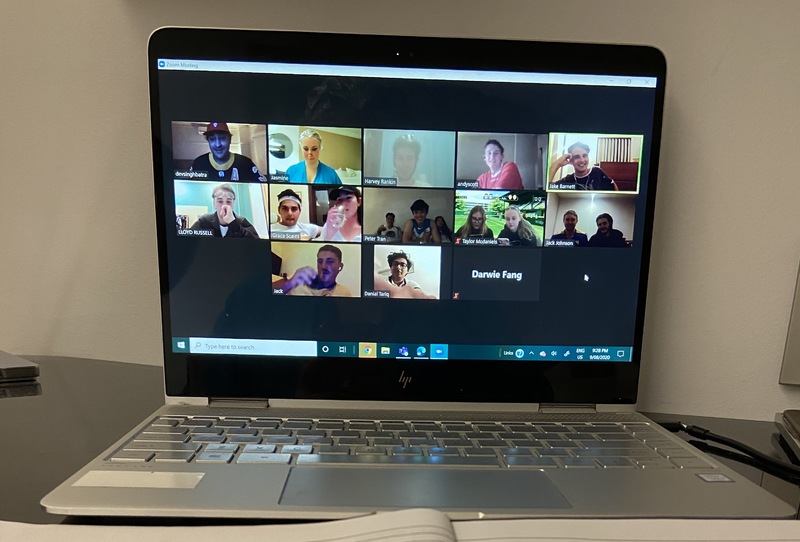
2020-08-09T21:28+10:00
This photo depicts me and my university friends catching up over Zoom and playing trivia. We played trivia multiple times over zoom, usually most Fridays, as a regular way to socialise while we were all apart during university holidays and Melbourne's second lockdown. The rules of our trivia games were as follows: every player would contribute $5, different people would volunteer to make trivia questions on whatever category they choose (including memes, dog breeds, logos etc.) and the overall winner that week would use the prize money to buy alcohol of their choice (we are students after all). We also had dress-up themes like sports and beach-wear, and bonus points would be allocated to best-dressed. These nights were the highlight of my week and gave me something to look forward to, breaking up the monotony of university assignments and lockdown. At the time this photo was taken, I had left Melbourne and was in hotel quarantine in Brisbane. This is also why zoom trivia worked well, because whilst some of my friends stayed in Melbourne, many of us moved out of the city to do lockdown with family in places like rural Victoria, New South Wales, Western Australia, and Queensland. Social media and video chats like Zoom functioned to connect us in new ways during the pandemic, and shows how the barriers of physical distance could be traversed via digital realms.
HIST30060.
-
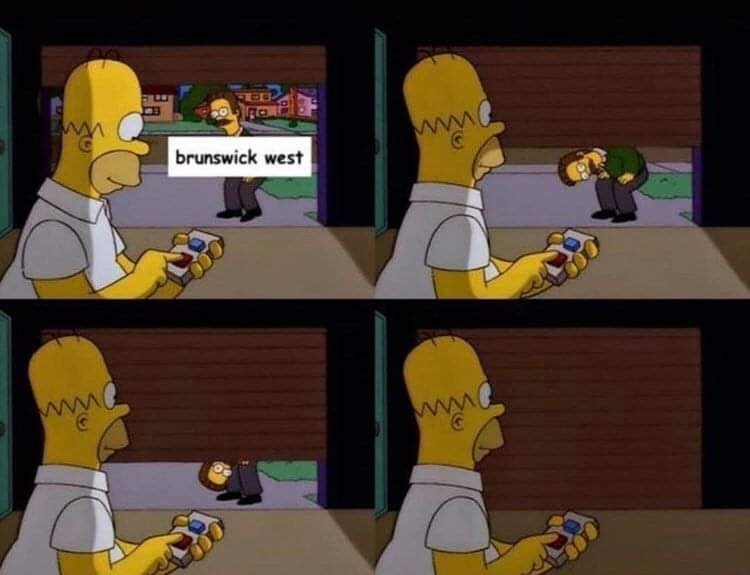
2020-06-30
This meme was posted in my Melbourne friends' Facebook Messenger group chat in the wake of Victorian Premier Daniel Andrews' announcement that certain 'hotspot' suburbs in Melbourne would return to Stage 3 lockdown at the end of June 2020. From the point of view of people outside of hotspot suburbs, it makes light of other neighbouring suburbs turning a blind eye to people who have to go back to lockdown, creating temporary walls between spaces, people and families. Unfortunately, because I lived in Brunswick West, I was one of the unlucky few in my friendship group who had to go back into lockdown. I watched on social media as all my other friends caught up with each other and took advantage of being able to travel more and go out to bars and cafes. As unlucky as I felt, memes like this one always functioned as a way to laugh at bad situations. My friends and I usually coped with lockdown through memes and jokes, characteristic of gen Z humour.
HIST30060.
-
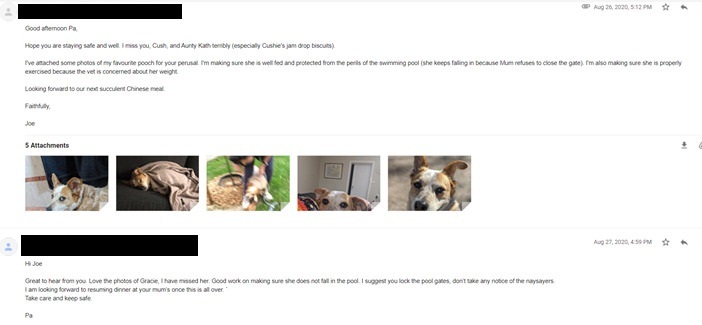
2020-08-26
I’ve missed my Grandpa terribly, but we’ve able to bond during the pandemic through a continuous email exchange concerning my dog. I’ll send him photos, and he’ll help me conspire ways to keep her safe from falling in our pool. We’ve been able to connect through our shared love of Gracie, even though we haven’t seen him or my Grandma for months. It’s been one of the most fulfilling experiences I’ve had in this plague year, especially because Grandpa is mostly deaf and can’t communicate well in person. It’s interesting how technology (and Gracie!) have facilitated connection between us. For a nonagenarian, he’s probably more proficient with technology than I am!
-
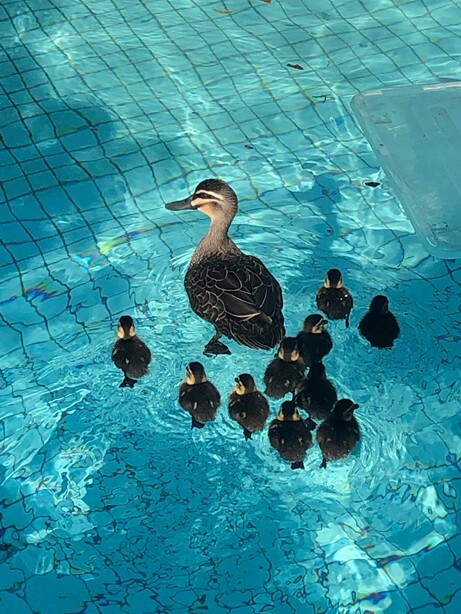
2020-07-10
HIST30060
Perhaps the most unexpected event in 2020 (bushfires and pandemic aside) for my family was the arrival of a proud mother duck with ten tiny ducklings. They’ve declared dominion over our pool and taken up permanent residence. I think it’s been cathartic for everyone to watch them grow and spread their wings – literally! The ducklings are just one of a number of new arrivals. We’ve also had currawongs, cockatoos, pigeons, doves, magpies and butcherbirds. They come and chill in the backyard, and mum makes sure they’re appropriately fed and watered. We think that we’ve had so many newcomers to our menagerie because of the bushfires at the start of the year, which destroyed a lot of natural habitat. But we also think the pandemic has played a role: with so many people spending all their exercise/recreational time in parks and nature reserves, disturbed birds have fled for greener pastures. I think it’s important to divorce ourselves from our own experiences of the plague year and consider how the pandemic has affected the natural world around us. We’re not alone in confronting change, and it would be selfish to only consider human experiences.
-
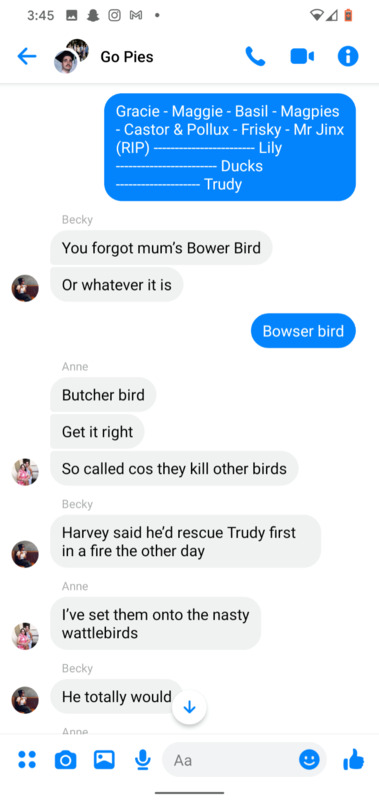
2020-09-26
HIST30060
My family is pretty large: I have two brothers, a sister….and a whole menagerie of animals! Gracie dog is the best, but we also have another dog, several cats, a rabbit, and a variety of feathered friends. My siblings live interstate, so we’ve been barred from seeing them since February because of border restrictions. During lockdown, we’ve been keeping in touch by having consistent arguments on our family group chat about how to rank our pets from best to worst. My brother frames it like a ‘best and fairest medal’, as you’d receive in sport. The conversations remind me of when we all used to live together at home, and they’ve provided a nice reprieve from more ominous discussions about the pandemonium enveloping society. I think the notion of ‘reprieve’ is central to the power of animals in this plague year: they distract us from our pandemic woes and force us to take a sabbatical from our anxieties.
-
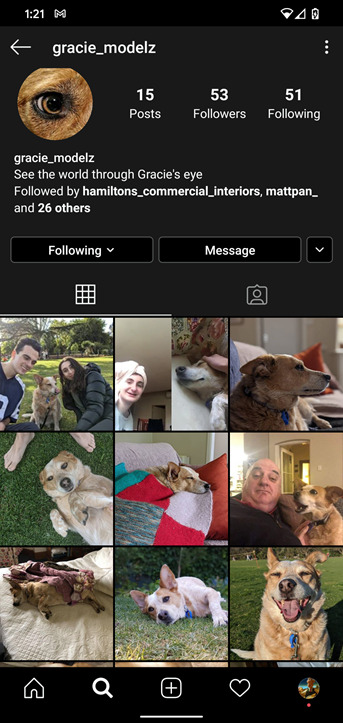
2020-09-01
HIST30060
I created an Instagram account during Victoria’s first lock-down to chronicle my experiences with my dog during the pandemic. It’s from Gracie’s perspective and purely for fun, but I think it also represents a rudimentary ‘barkive’ with insight into how ‘stay-at-home’ mandates provided refreshed impetus to interact with our furry friends and rely upon them for comfort and companionship.
-
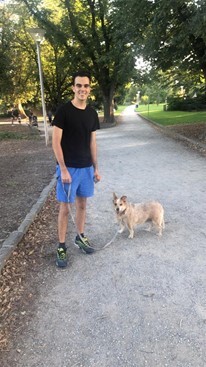
2020-07-21
HIST30060
It’s been difficult not seeing friends and family, but one stalwart of this year has been Gracie: my beautiful four-legged companion. Gracie’s been a source of much needed support this year, accompanying me on my daily allotted exercise and stopping for regular belly rubs. She’s cut through the pandemonium and provided me with a constant supply of love and laughter. I think pets have outperformed themselves this year, especially when human connection has been sparse due to restrictions. ‘History from below’ might not literally mean below knee-level, but I think considering the experience of pets during the pandemic will be a valuable avenue of historical enquiry.
-
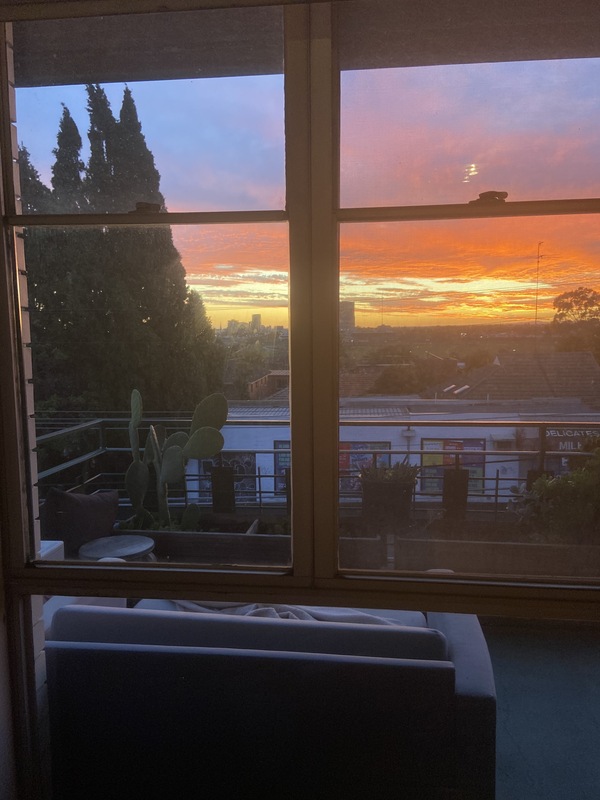
2020-05-12T17:30+10:00
This photograph depicts a sunset from my apartment in Brunswick West, Melbourne on May 12, just before lockdown restrictions begin to ease in Victoria for the first time since March. I had spent that time completely alone in that apartment, as my room mate left for Queensland before lockdown began, my family mainly lived in Queensland, and my friends lived outside my suburb so I could not visit them. This was isolating in multiple ways and led to boredom, sadness, depression, agoraphobia and loneliness. I captured many sunsets like this over the months in my apartment, which brought a small bit of light amidst the dark monotony of lockdown. From this view I could imagine what lied beyond the walls of my small living space, and look forward to a day where I could feel safe moving beyond home and my nearby grocery store.
HIST30060.
-
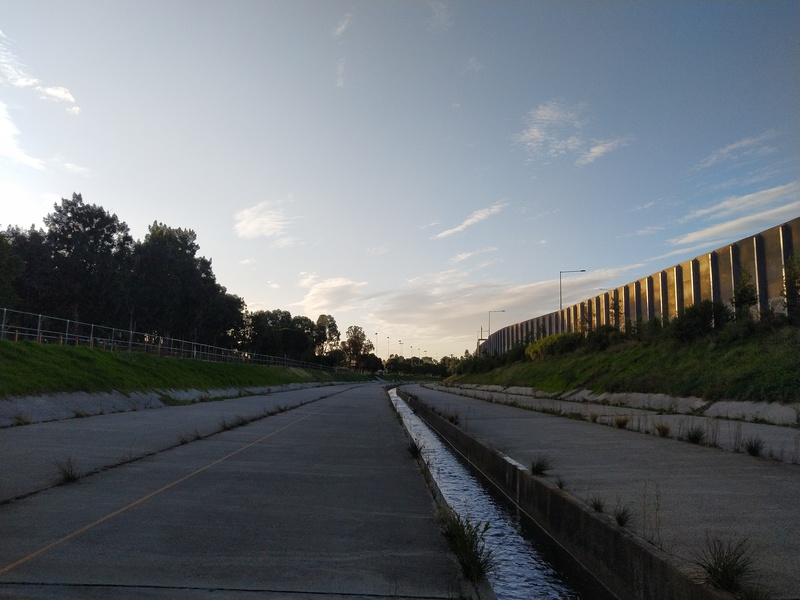
2020-07-05
This is the Moonee Ponds Drain. Concrete behemouth.
Primary function: transport storm water to the Bay via the Maribyrnong River.
Secondary functions (that came to light under lockdown): bike path, rollerblading circuit, mushroom foraging field, freeway viewing platform, late night extension of the lounge room during household parties, study break spot, skate park, graffiti canvas, shortcut to nearby suburbs, and shopping cart disposal pit.
This place truly brings the community together.
HIST 30060
-
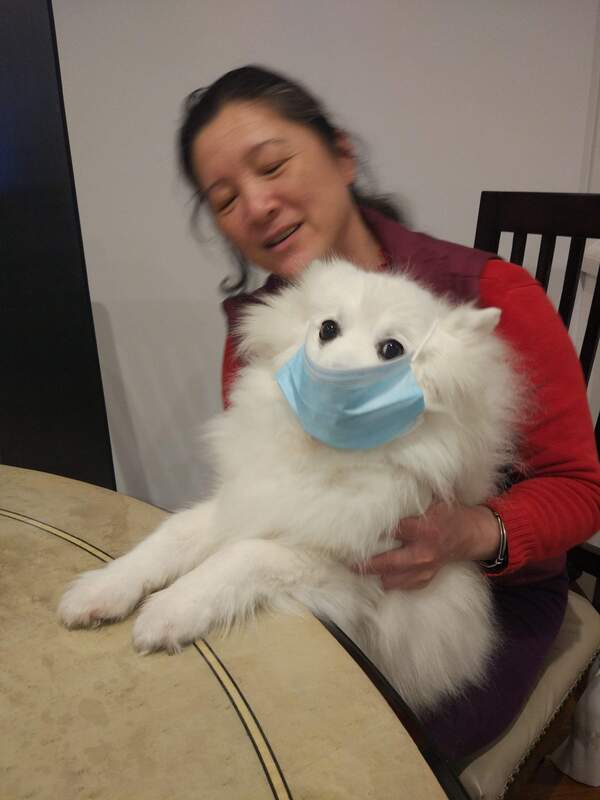
2020-08-07
My mum sent me this very adorable photo of my dog wearing a face mask to gently remind me to wear a mask while in public to keep me safe from COVID-19. In Victoria, masks have been mandated in all public areas since July, regardless of social distancing. My mum sent this photo to some of our friends and family too, to cheer them up during the difficult times Victoria was going through at the time with a strong rise in cases. She had also reminded me, like with how our dog Snowy was wearing it in the photo, to make to cover both the mouth and the nose for the mask to function properly. Snowy did not much like wearing the mask, but he certainly looked extremely cute in it! Although at the time when my mum sent me this picture she had meant it as a joke, unfortunately with the new strain of the COVID mutation rumouring to originate from minks in Denmark, the possibility of dogs or cats contracting COVID-19 perhaps isn't so far-fetched. Remember to wear a mask and stay safe!
-
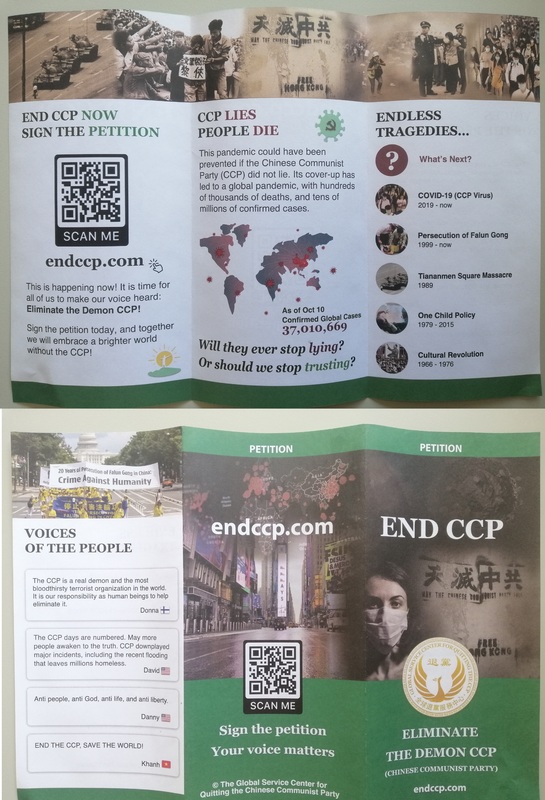
2020-11-09
This is a pamphlet I got in my mailbox from the Global Service Centre for Ending the Chinese Communist Party, inside which describes many of the 'evils' of the CCP including malicious negligence in the spread of COVID-19. It was quite unusual for me to receive this in my mailbox, I'm assuming since it was not a posted letter it was simply dropped off to many houses in my neighbourhood. The writing in it is quite sensationalistic, and was clearly extremely critical of the Chinese Communist Party. A lot of information and misinformation has been spread regarding the origins and handling of COVID-19, and much of it relies on fear and distrust to propagate.
-
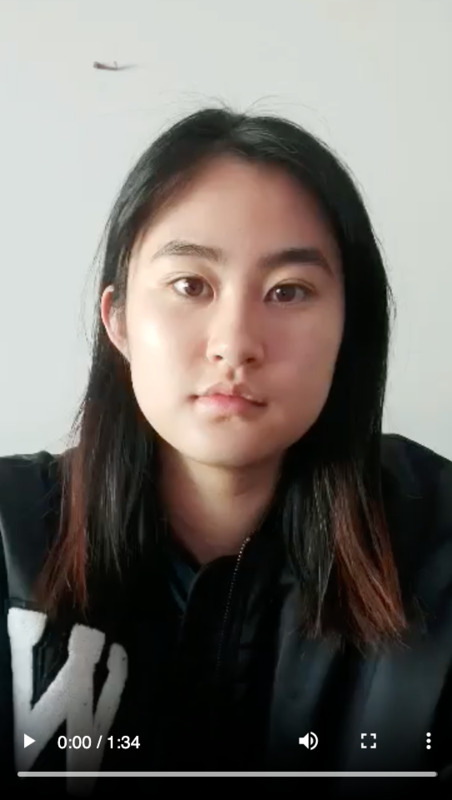
2020-03-23
This is a short video where I asked my friend Nikko Guan to share her experiences with casual racism toward ethnic Asians at the beginning of the pandemic here in Melbourne, Australia. There was a lot of panic and misinformation surrounding the coronavirus, and a lot of people attributed the origin of the virus (Wuhan China) with the cause of the virus and harboured distrust toward anyone who looked remotely foreign or Asian. Some of my friends and acquaintances who were Asian but not even Chinese also reported similar experiences. It's especially pertinent as this also affected Asian diaspora who were born in Australia and may have never even been overseas, but are judged purely on their appearance. My friend in the interview had not been to China, or anywhere internationally, for many years. It's important that a global disaster that is the result of natural catastrophe isn't judged on malice for political or racial prejudices.
-
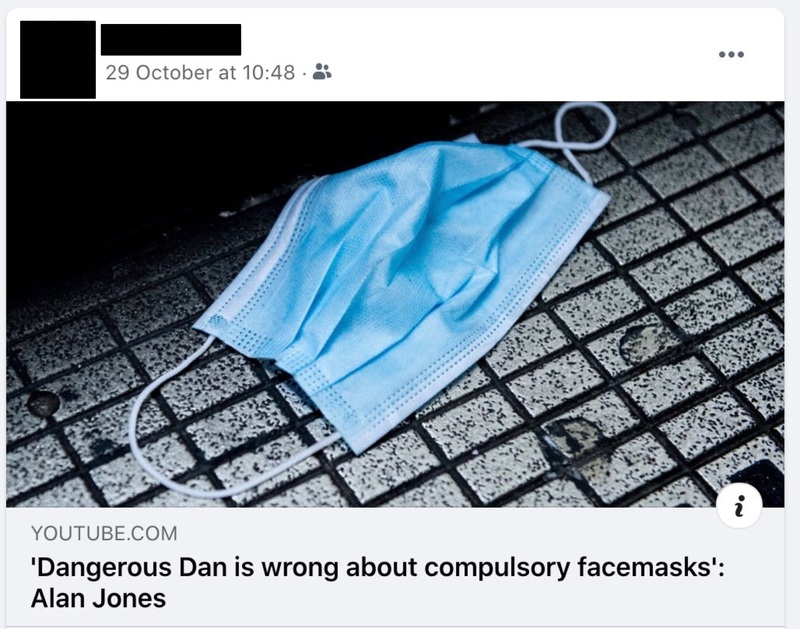
2020-10-06
(HIST30060) Content warning: suicide mention.
As the pandemic has developed over the course of the year and Victoria has progressed through lockdowns, a Facebook friend of mine from high school has taken to discussing COVID-19 extensively. She posts very regularly (on average between 20 and 30 times per day) with commentary on the pandemic, ranging from sanctimonious to outraged, sharing posts from conspiracy groups, pandemic-denying politicians, and other Facebook users that downplay the existence or severity of the virus. The series of unsubstantiated claims and recurrent mentions of ‘breaking news’ from various unnamed rogue health workers results in some of her Facebook friends querying her content and questioning the validity of her sources. When they reply to her posts, her Facebook friends often attempt to share news articles and updates from verified, fact-checked sources, but when this happens she talks past them, avoids the question, engages in a range of logical fallacies, or outright denies the validity of the information with which she’s been presented. In particular, she received significant backlash from her friends when she shared a post about the Australian suicide rate in 2020, crediting an alleged (untrue) increase directly to the lockdowns: one friend responded to say ‘I’m swiftly losing respect for you and the misinformation you keep posting.’ Earlier in the year, her posts gained greater traction among her Facebook friends: people would react to them, comment with information, speculation, or gentle disagreement; by now (November), the engagement her posts receive has dwindled down to the occasional like, but usually nothing more than that.
Seeing her posts when I checked Facebook began to remind me of a conversation I’d had with my housemate about the role of fear and a desire for control behind belief in conspiracy theories; namely that these belief systems might bring warped comfort on some level. In situations that are scary, believing in some nameless, faceless ‘them’, or connecting with other people who claim to have secret insider information hidden from the general public, might help ease a feeling of powerlessness by believing someone is in control. I would allege her Facebook posts stem at least in part from fear, which I feel is more than understandable given an underlying experience for many people this year has been a deep, semi-constant sense of paralytic uncertainty.
While I empathise with this, and genuinely feel compassion towards her for what she’s going through, I can’t help but think the way she has responded to these feelings is irresponsible at best, and dangerous at worst. I find her advocacy of the importance of independent research and critical thinking approaches irony, as the ‘research’ she describes appears to consist of discussing factually incorrect information with other scared people who are also searching for stability and predictability. I don’t begrudge her the fear she feels in any capacity, nor do I want to pass judgement on how others cope with this experience, but I can’t help feeling that this does more harm than good; I worry it proliferates false information, and further demoralises those who read it. While individual conjecture, ideas, philosophising, and critical thinking are absolutely necessary and a healthy degree of scepticism is vital when reading anything, I believe there is a degree of responsibility one assumes to check, even cursorily, that the content they’re sharing has some basis in fact, especially in instances like this where people are quite literally dying. While the experience of the pandemic is undoubtedly having a severe effect on her, I feel irritated reading her advocacy of things that will objectively place other people at risk of illness. It seems to me insensitive to spread deliberately divisive misinformation, given there are people who are assume risk every day when they go to work (even in a country that has implemented measures to control the spread of the disease, when many countries overseas have not). I worry about the broader social repercussions of the division and polarisation that misinformation contributes to, both in the case of COVID-19 and in other contexts.
When I look over the things she’s been posting on Facebook, I feel overwhelming pity and compassion for what she is going through individually, and what everyone in Victoria is undergoing as a collective. I understand that everyone is coping with an extremely stressful and emotionally taxing experience and is attempting to manage as well as they can. I’ve seen parallels drawn between the COVID-19 pandemic and previous pandemic disease outbreaks and major historical events in general, and the comfort people derive from a sense of shared experience during difficulty. I think in part the pandemic has cemented in my mind the confronting fact that being alive is just living through a series of major historical events; that history is not something that has happened to other people, in other places, at other times, but is happening now and will continue to happen, over and over. While this is incredibly confronting to think about and dredges up an overwhelming feeling of powerlessness at times, it seems to me by looking at both the past and the present that people working to mutually support each other make upheaval, fear, and uncertainty much easier to bear.
-
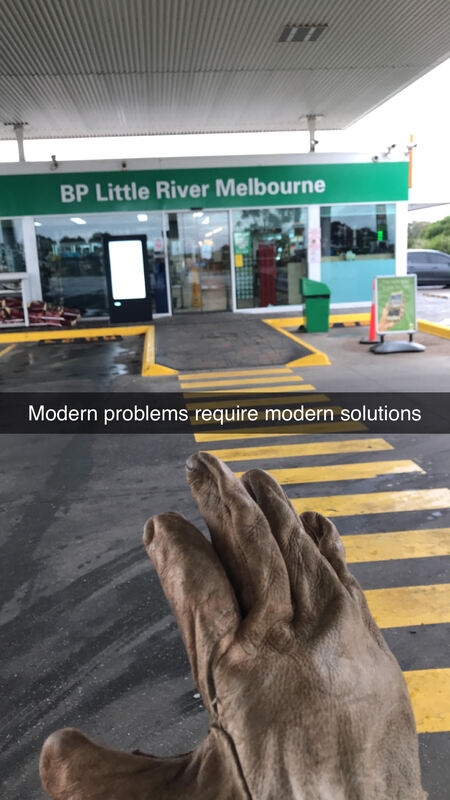
2020-11-09
In the series of images depicted above, I portray the imminent changes to both my life and the lives of those I love. The stage three lockdown which dawned on the 8th of July 2020 somewhat replicated a tale of two cities. A ‘Ring of Steel’ enforced between metro and regional Victoria separated a state in the grip of a deadly second wave. For me personally, 2020 changed my life in two notable ways; my two worlds were separated, and as droll as it sounds, I couldn’t get my dog a haircut.
The ring of steel meant that I was separated from both my family property and my boyfriend who lives in Regional Victoria, although we could still visit one another it just didn’t feel the same. Like going through customs at an airport you are grilled on your reasons for travelling into a regional zone, and the answer of visiting a partner seemed to also evoke a multitude of other questions confirming the validity of the aforementioned statement. This however was all very necessary as there are regions of Victoria that haven’t even seen one single case of COVID since it reached Australia in January 2020. My first image was taken one day upon my return to Melbourne from seeing my boyfriend in regional Victoria and epitomises how even back in April, COVID-related precautions were widespread. Whilst my second photograph pinpoints the outage which the Vic Roads change of address function encountered a day prior to the announcement of the ‘Ring of Steel’ on July 9, 2020. The third photo is a government document and summary of those restrictions that were also outlined from this date onwards.
Stage 4 restrictions also meant that all non-essential services were shut to combat the unnecessary spread of the virus, and this included dog groomers. Our West Highland White Terrier Angus was certainly thankful for this as sitting still is not his strong point, but it also meant that he could hardly see with his hair growing over his eyes like a veranda. There were calls from the RSPCA to re-open these services to the public earlier as they had treated a number of grisly injuries from owners attempting at home cuts on their pooches. Whilst a number of petitions were also got up by dog groomers who were more concerned about the welfare of the animals rather than the business aspect. With continuous lobbying, the efforts of the animal welfare community paid off and on the 28th of September they were able to resume services, a far cry from October 26th the original date outlined. The fourth and fifth photo depicts Angus before and after his much-needed haircut in early October.
-
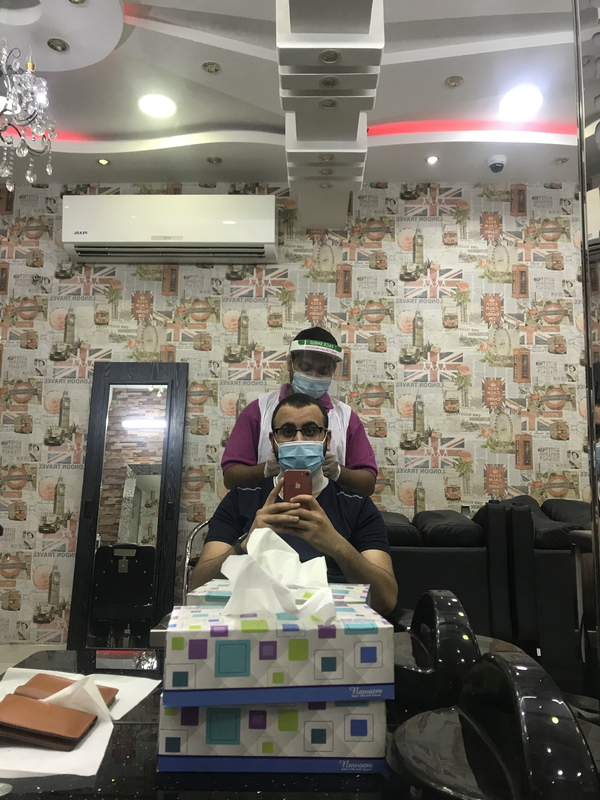
2020-11-09
With COVID-19, even things as simple as getting a haircut were never the same. The photo above shows what that looked like.
In Bahrain, where I live, hairdressers were closed down in March and were only reopened months later.
When they finally did, patrons and customers had to abide by certain restrictions.
There was only a fixed number of customers allowed in. Body temperatures had to be taken. Contact details had to be provided for the purposes of contact tracing in case anyone was exposed to the virus.
Masks and face shields were mandatory for the persons giving the haircuts.
Moreover, many people seem to not want to handle cash, and as a result, cashless payments are more popular than ever.
This reflection was submitted as part of the HIST30060 Making History project at the University of Melbourne.
HIST30060.
-
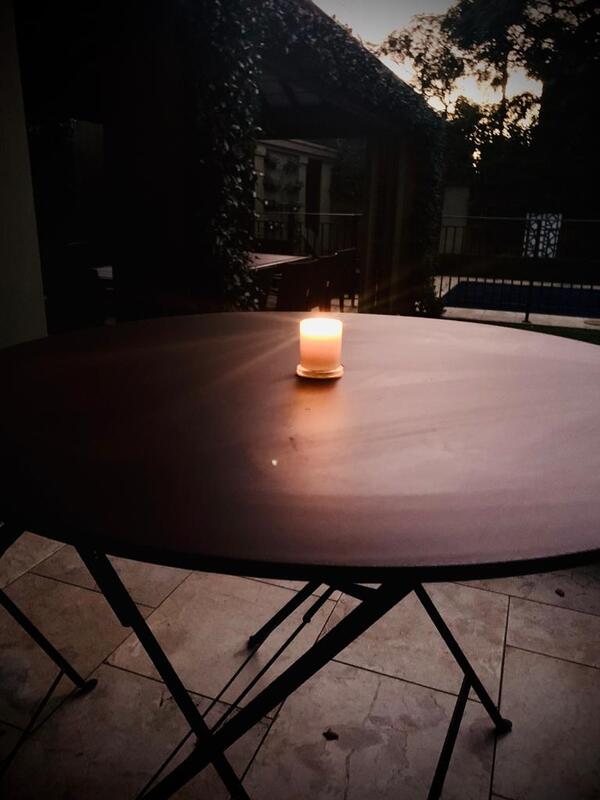
2020-04
Like many families we participated in a dawn service unlike any previously held this year. As gatherings and official ceremonies were cancelled people looked for alternate ways to commemorate ANZAC day. Across the country there was a movement to participate in a unified but socially distanced way. Lighting a small candle and observing the minute silence made us all feel a little more connected during the height of the Sydney lockdown.
-
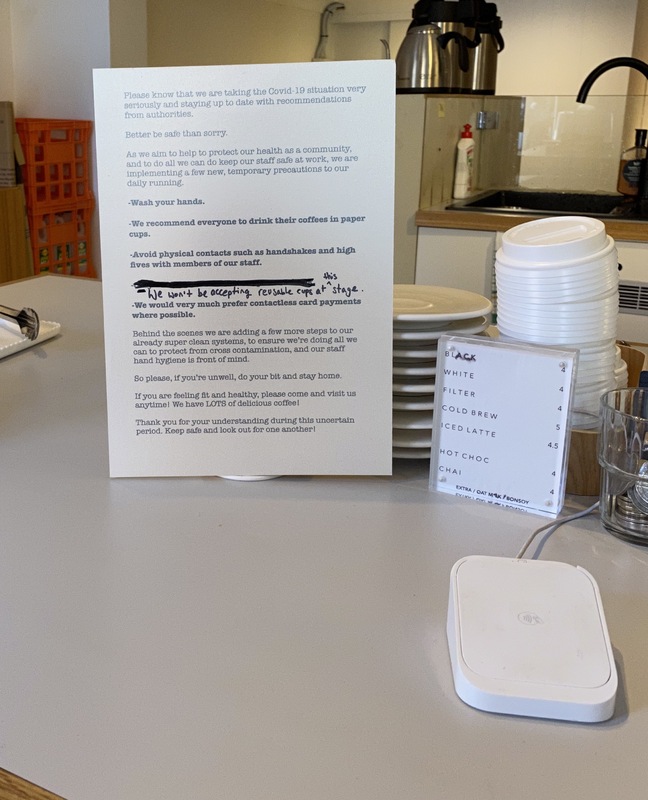
2020
While COVID-19 restrictions became part of the everyday, it was at times difficult to keep track of their constant changes and revisions. Businesses started to put up signs outlining their policies for staff and clients to keep everyone safe. The first image is from a cafe in Potts Point, one of many local businesses put under strain by the pandemic. The second is from an aged-care facility in Woollahra in response to the beginning of the second-wave outbreak in Melbourne.
-
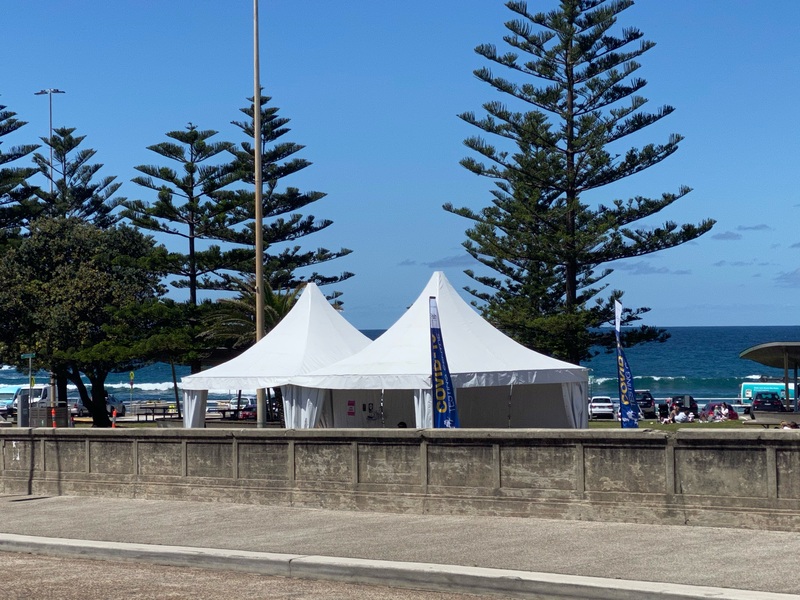
2020-11-08
HIST30060
To accomodate the huge numbers of people needing COVID-19 tests, a screening clinic was erected in the Bondi Beach carpark. The first time I saw it, I didn’t really know what to think. Of course I was pleased, and proud, that Sydney was creating free and open spaces to test as many people for COVID-19 as possible. But seeing the clinic in Bondi, against the sunny beach, felt surreal. Even after months of living with the pandemic there’s still something indescribably strange about such a familiar place having to adapt to COVID-19.
-
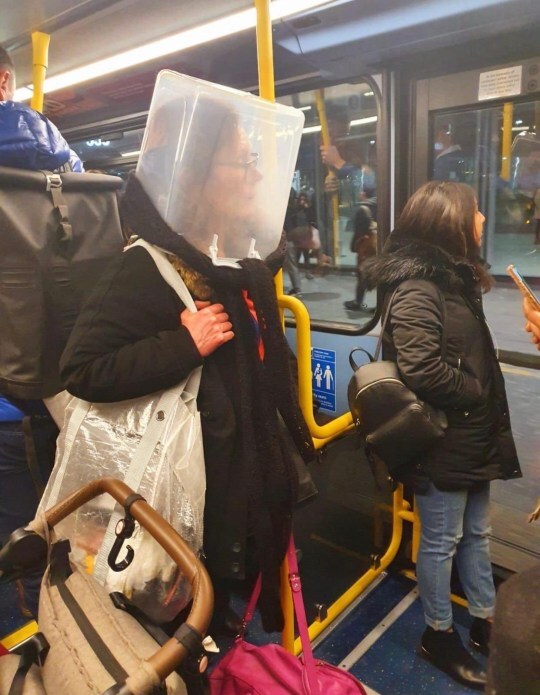
2020-07-22
HIST30060: Making History
From 22nd July 2020, it became compulsory in Victoria for everyone to wear a properly-fitted face mask when out in public. This was indeed commonsense for a lot of people, many in the streets already starting to wear face coverings before the official ruling came into place. But just because it’s commonsense does not mean it is at all easy or comfortable or that it will not be the cause of what is now known as ‘mascne’. At first, the adrenaline rush of it all meant that wearing a mask felt kind of cool, and made everyone look like a spy, or at least made you feel like one. And it was quite entertaining to see people taking it all the way with their creative face coverings. But after a while, it was kind of annoying to put on a mask to take out your rubbish, made afternoon walks a bit more sweaty on the face (and noisy with the sound of your own muffled breath from being puffed, also caused by the reduction in exercise during quarantine). But with all the minor inconveniences of wearing a mask during a pandemic, you are mostly thankful it’s compulsory in your city, especially when someone on the bus coughs.
-

2020
HIST30060: Making History
Stationery businesses are really milking year that was 2020. With lockdowns, quarantines, and cancelled or postponed events, anyone who bought a fresh new planner in anticipation of filling them with exciting appointments knows the disappointment of staring at the blank pages – or even worse, seeing the words, “Zoom Meeting.” Thus, the planners and diaries industry have really seemed to stepped it up a notch with their tactical launch of new products for the upcoming new year. Marketing new 2021 planners from as early as mid-2020, this false sense of acceleration into the future also falsely proposes that crossing that line into a new year somehow means the current global troubles of economy, virus and politics will somehow poof into the past, with no guarantee that our planners won’t be as empty as they were in the past year. With that being said, I totally caved into the marketing and bought a planner anyways.
-
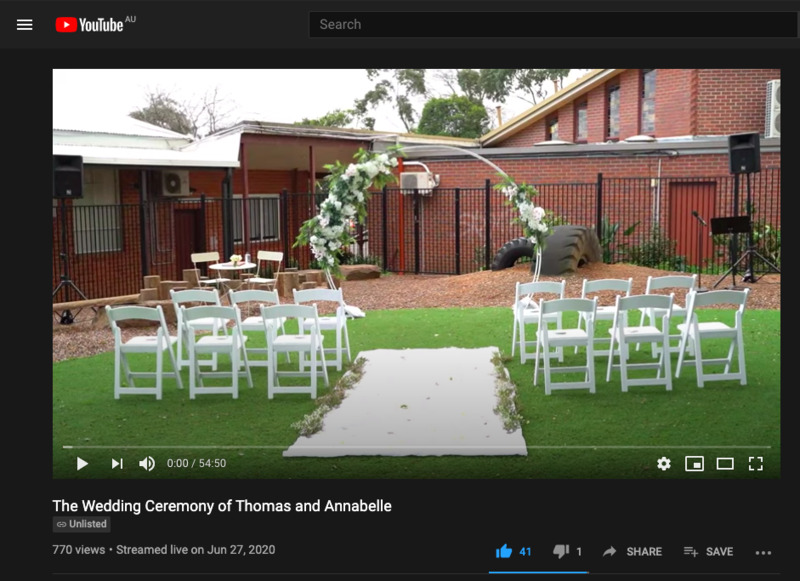
2020-06-27
HIST30060: Making History
My husband I planned our wedding for November 2020. My extended family lives in Malaysia, and we had organized for them to fly over to Melbourne for the celebrations, inclusive of classic wedding dancing, food and merriment. It obviously did not happen like that – but, it was better. In March, when the restrictions hit Victoria, we decided to move our wedding to June, not even knowing how many guests we would be able to have at that point. A few of our friends eloped, and some even planned a wedding in one night to accommodate the changing restrictions. In the weeks leading up, we pulled together our 20-person guest list, hired a photographer, and on the 27th June 2020, got married in intimate courtyard of our parents’ church. There was no (intense) dancing or fancy decorations, instead we got to focus on each other, on vows we made to each other under God and before our closest family and friends, and we got to live-stream our ceremony to everyone else (big win to not offending anyone). We are so thankful to God – it is better than we could have imagined or planned for ourselves.
-
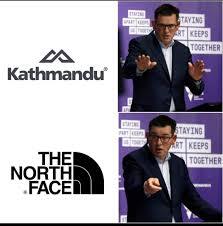
2020
HIST30060: Making History
Since March 2020, Melbourne has collectively been in lockdown for 112 days – apparently, the longest lockdown in the world. The definition of ‘lockdown’ has gone through a few editions, but it largely meant that people could only leave their homes for (four) essential reasons, most physical stores were not open or were limited to click-and-collect or takeaway, you could not see more than 1-2 people outside the people you live with, and this seemingly perpetual sense of not being able to do anything. A key element of this period was the anticipation (or dread) of Victorian Premier Daniel Andrews’ daily coronavirus update press conferences. The attention on these daily updates intensified to the point of codifying Andrews’ outfits to deduce whether his announcements would be happy or upsetting for Victorians keen to get out of lockdown. If he was in full business suit: bad, restrictions are about to get harsher, if he was wearing a North Face puffer jacket: good, you and your mates might be able to get your beers on again.
-
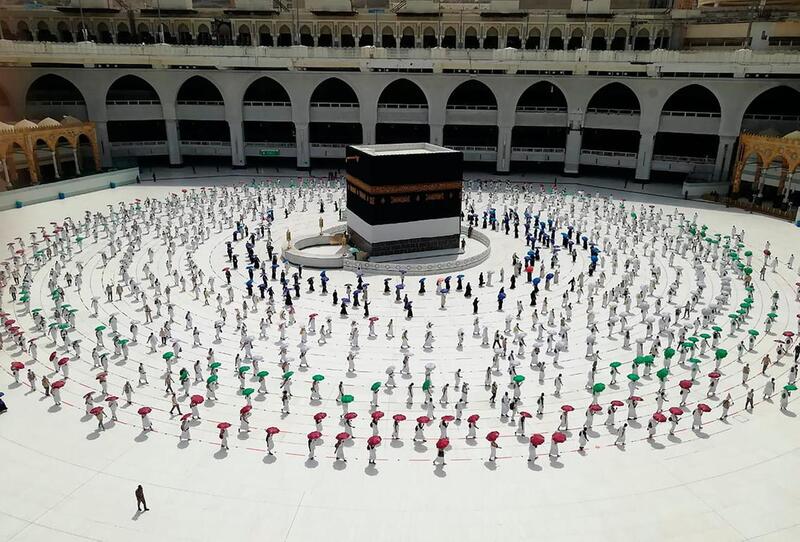
2020-11-09
Religious observance was one of the many aspects of daily life affected by the COVID-19 pandemic.
In my home country of Bahrain, congregational prayers were prohibited in mid-March, in an effort to slow the spread of the virus.
The Friday prayers were restricted to only a single mosque, Bahrain’s largest. Under normal circumstances, Muslim congregants would stand shoulder to shoulder in prayer. This was no longer the case as seen in the photo, social distancing and mask wearing was enforced.
The Islamic call prayer (the Azan) was altered, the normal line summoning the faithful to prayer “come to prayer, come to good deeds” was instead replaced with the line “pray in your homes” (as seen in the attached video, which I recorded in Bahrain on).
It was surreal hearing this for the time. The Covid-19 pandemic was the first event, at least in my lifetime, where this was done. Historically, this had precedents in times of plague.
Moreover, the Muslim Hajj pilgrimage, which draws millions to the city of Mecca in Saudi Arabia every year, was this year limited to a symbolic 1,000 pilgrims.
Having attended the Haj myself a decade earlier and been in the midst of the human masses that descend on Mecca, it was very strange to observe the images of the few socially distanced pilgrims which undertook the Hajj in late July 2020.
-
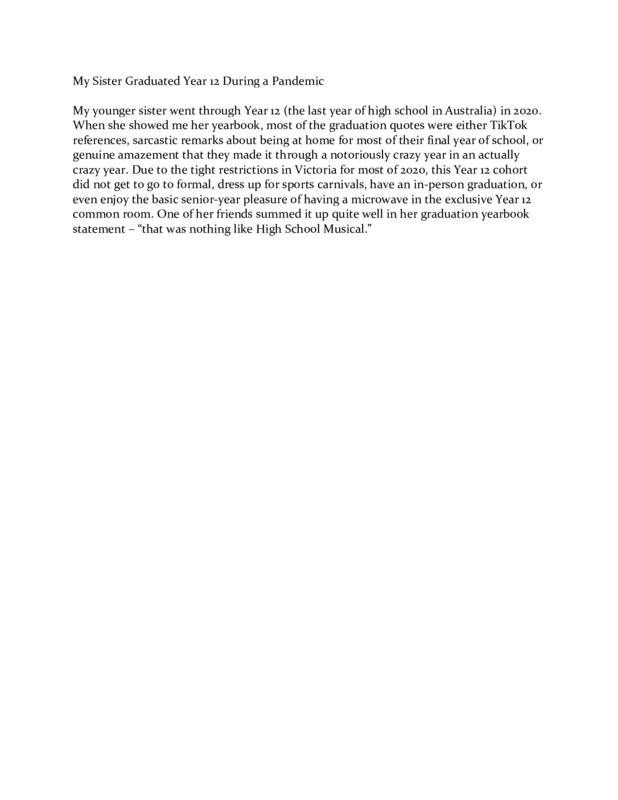
2020-10-28
My younger sister went through Year 12 (the last year of high school in Australia) in 2020. When she showed me her yearbook, most of the graduation quotes were either TikTok references, sarcastic remarks about being at home for most of their final year of school, or genuine amazement that they made it through a notoriously crazy year in an actually crazy year. Due to the tight restrictions in Victoria for most of 2020, this Year 12 cohort did not get to go to formal, dress up for sports carnivals, have an in-person graduation, or even enjoy the basic senior-year pleasure of having a microwave in the exclusive Year 12 common room. One of her friends summed it up quite well in her graduation yearbook statement – “that was nothing like High School Musical.”
-
2020-11-09
1. The Trump family contracting Covid
When my friend first texted me about Donald and Melania Trump contracting Covid-19, I let out a hysterical laugh. To me, it wasn’t Trump, the person, contracting the virus that was funny but rather Trump, the one who belittled the effects of the virus and avoided taking meaningful measures to minimise its impact, that was funny. It was a stark reminder that boundaries between the powerful and the powerless, between the wealthy and the disadvantaged, between the authorities and the ones subject to authority, between varying socioeconomic standings can be blurred, especially in the case of a global pandemic. While pandemics have an undeniable impact on the disadvantaged or those with lower socioeconomic means, its impact on a figure such as Trump somewhat demonstrated that no one is beyond a virus.
2. Stigmatising Migrant Communities in Victoria
When the second outbreak unfolded in Victoria, it was really interesting to, firstly, see the socioeconomic inequalities come into light and, secondly, the Victorian migrant communities framed as the problem. They were projected to be the cause of the second outbreak in Victoria which prompted the media to monopolise on this racist and bigoted rhetoric of migrants causing trouble. The media and some members of the public (through social media) insinuated that migrant communities’ culture was, by default, antithetical to the Australian way of life and thrust Victoria into another lockdown. It later became clear that the Victorian government’s hotel quarantine disaster prompted a second outbreak. The security personnel and other staff employed by the Victorian government spread the virus to a handful of postcodes in Victoria. The areas where the outbreaks first began to emerge were areas with lower socioeconomic standing and migrant communities. Considering that these staff members were from these postcodes, the outbreak seemed to be prompted and furthered by the migrant culture which supposedly allowed for the flouting of restrictions, mass gatherings and, therefore, quick local transmission of the virus. The wealthier suburbs or postcodes weren’t hit as hard. Thus, demonstrating the existing socioeconomic inequalities in Victoria and the way in which some communities were hit harder than others. It was striking to see how easily a community can be framed and dismissed as the other and the troublemaker. Additionally, this may speak to the debates or concerns which are left outside the national discussion which, in turn, can contribute to a specific historical record based on the dominant narrative. In Victoria’s case, perhaps this can be the more general covid lockdown narrative which for the average Victorian is divorced from any ethnic implications whilst for other Victorians, the connotations associated with their ethnic identities, particularly in the context of the covid pandemic, is warped and bigoted.
3. Burqa vs. facemask hypocrisy – facemasks can become the normalcy but burqa’s never will
With the introduction of the coronavirus restrictions around the world, it was interesting to see the discourse around face-covering change, particularly, in the West. For about two decades, following 9/11 in America, there has been negative messaging around the burqa some Muslim women choose to wear. It was deemed socially unacceptable and antithetical to societal norms or appropriateness. Muslim women have been subjected to vilification and have been told that the burqa limits communication and is a symbol of an anti-western patriarchal tradition. There seems to be a hypocrisy around this issue in that while a health concern can normalise a face covering, religious reasoning seems insufficient. While the historical baggage associated with the burqa far surpasses this debate of covering versus revealing the face and, of course, while the health benefits of a face mask is of great importance, there is room to view it with a somewhat binary approach. Put more plainly, it seems while the health implications of any form of face covering or clothing items can allow officials to impose policies around mandatory face covering, religion or, more importantly, freedom of choice, does not offer enough of an incentive for officials to consider burqas as societally and socially acceptable. I believe the policies begat from health concerns are of prime importance. However, these policies can coexist alongside policies of acceptance. Thus, the reframing of societal norms to accommodate for another’s interpretation of their religious obligations.
4. Family member in hospital during Covid
With the Covid pandemic, 2020 is probably one of the worst years to approach a hospital in any way. My family and I were unfortunate to have experienced a situation (not Covid-19 related) which required us to rush a family member to the hospital. I found that it was one of the hardest things I have had to cope with throughout my life. This is a photo of my family member’s patient wristband. As nurses in the emergency were asking one another about whether the incoming patients were swabbed for covid, the added difficulties of this situation were clear. The limited contact I was able to have with my family member due to the hyper alert covid environment at the hospital deeply frustrated me. These were perhaps the organic happenings of life, however, not having the option of being beside my family member and only seeing my family member for 2 hours in a day was tormenting. It was also a reminder of how varied the experiences of the lockdown and restrictions could be. Alongside the general difficulties of the pandemic and the lockdown, there could be added layers of complexity which may range from living arrangements, work, race, socioeconomic status to, in our case, an unexpected health condition.
5. TikTok dance
Similar to the millions of others out there during the lockdown, I had my fair share of busting some dance moves on TikTok with my house mate. This made me appreciate the little fleeting moments of happiness even in a very grim-looking world with the virus ravaging communities across the globe. Making this video, learning the dance moves and continuously getting the moves wrong was the most upbeat, thrilling and enjoyable fun I had during quarantine. Also, given that I thought I would never use TikTok, I somewhat understood the solace most of its users found in the app, especially, more than ever, during a global pandemic.
-
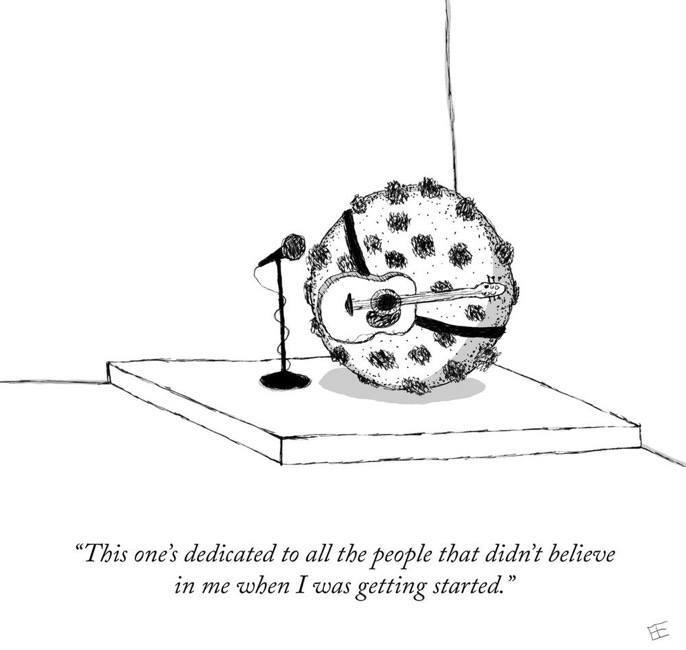
2020-10
HIST30060
These images demonsrtate the ways that people online and in charge of covid responses have responded to the pandemic.
These are all demonstrations of how I have been impacted by the pandemic, by having to leave my exchange, and by my university having been moved entirely online.
-
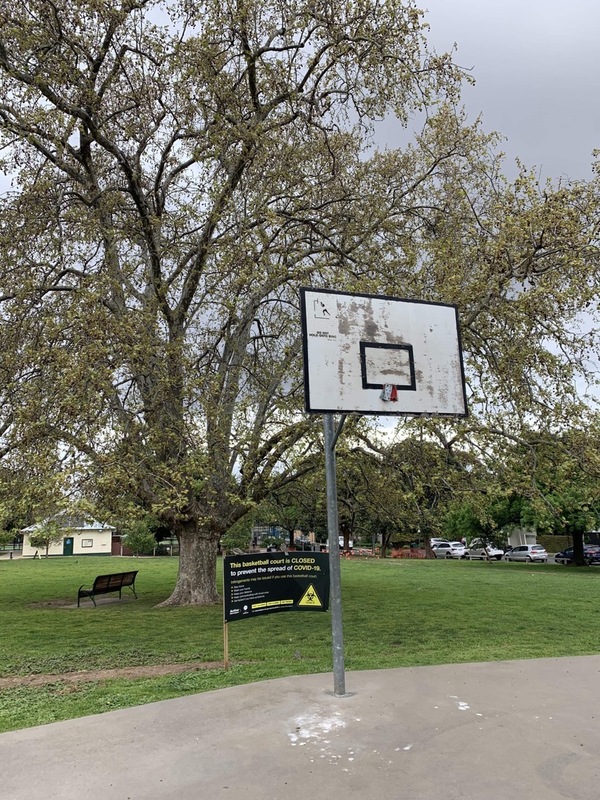
2020-09-03
This is an image I took of a basketball court at my local park that had had its basketball hoop unscrewed. As I stood there and looked at it, I realised the weight of the pandemic in terms of its social impact.
-
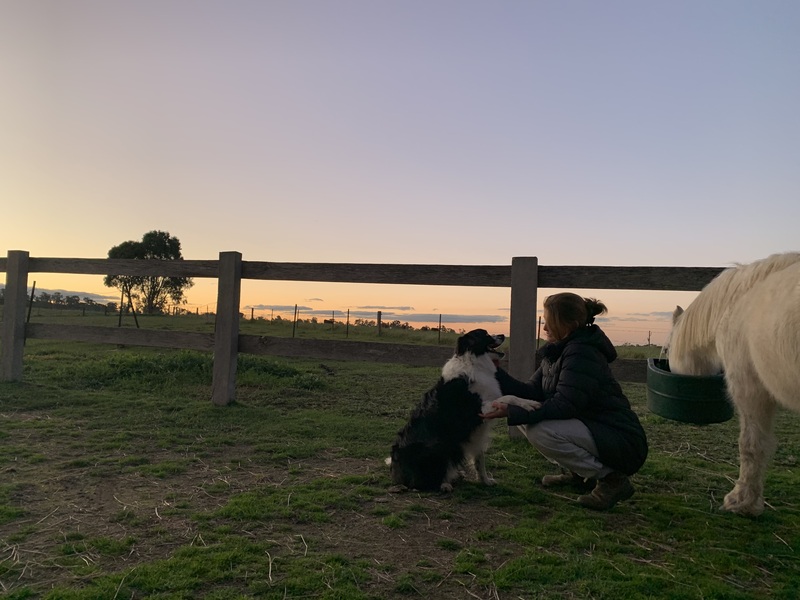
2020-07-20
This represents what friendship means to me. My dog is my best friend and was the best supporter I could ask for during the 8 months Melbourne was in lockdown.
-
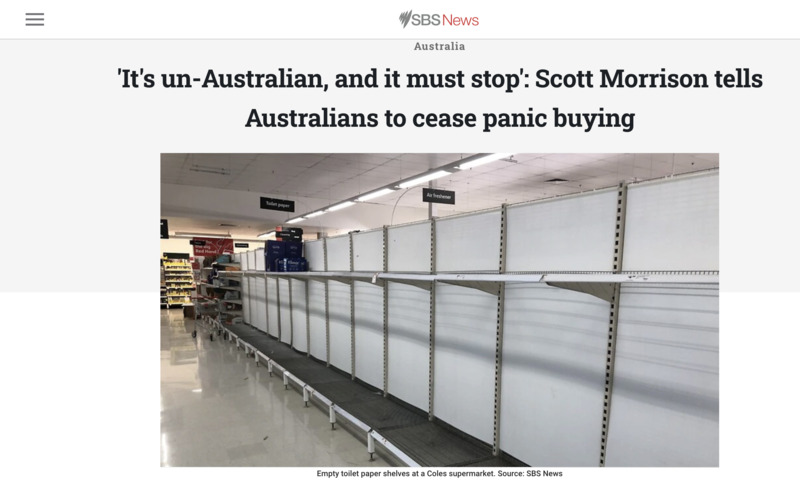
2020-03-13
HIST30060
This is an image captured in a Coles supermarket of a toilet paper aisle empty as Melbournians rushed to make sure they weren't left without during the COVID lockdown
-
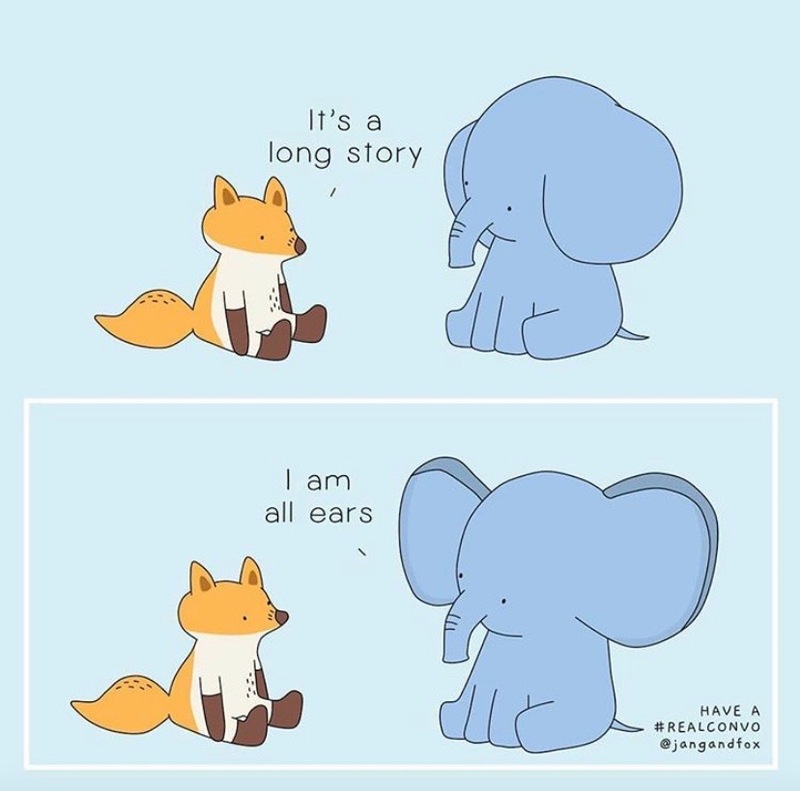
2020-07-05
HIST30060
This illustration represents the importance of reaching out to people in times of need. I chose this because it was sent to me by my sister as I suffer from severe Obsessive Compulsive Disorder (OCD) and during COVID my mental health measurably deteriorated.
-
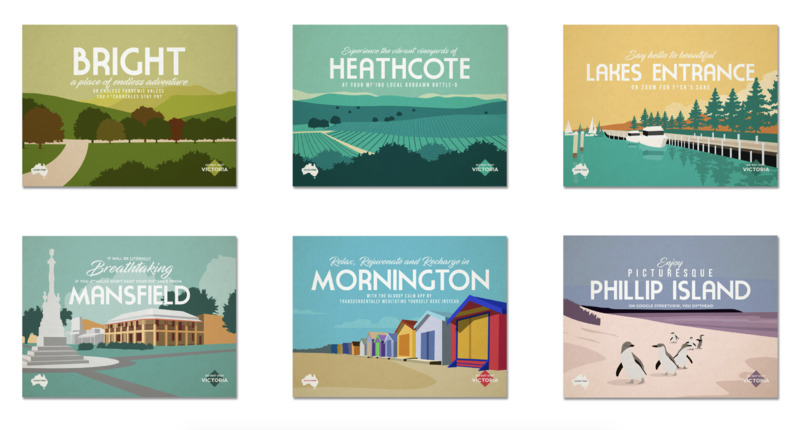
2020-06-19
HIST30060.
This is a screenshot of anti-tourism postcards that were published when Melbourne went back into stage 3 lockdown. Their purpose was to deter Melbournians from travelling to regional Victoria. I selected this source as I believed this campaign was promoting the wrong behaviour of which we should all treat each other. During COVID, being caring, kind and empathetic to one another is needed in order to get through each day, and I felt these postcards were seeking to do the opposite of what we needed.
-
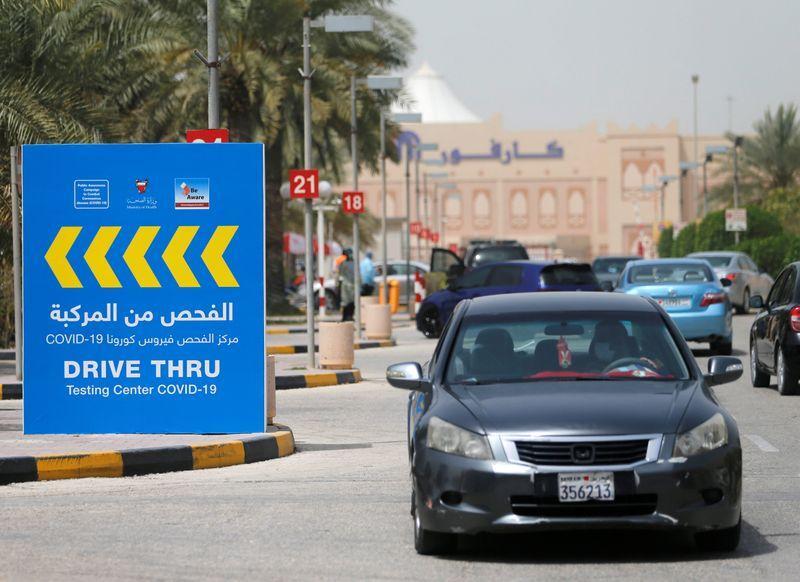
2020-07-16
The following is a reflection on my experience in COVID-19 testing and self-isolation, after returning to my home country Bahrain from Australia, where I am a student.
Upon arriving in Bahrain International Airport, travellers are taken aboard buses into a giant white tent-structure. Here, my temperature was taken. Then, I was escorted to one of the desks (mostly staffed by young volunteers) where I give my personal details, including where I intend to spend my 10 days of self-isolation (the Government of Bahrain had only recently reduced the requirement from 14 days).
After that, I had the COVID-19 PCR test taken (quick but unpleasant nose swab). The results are published via the “Be Aware” app within 24 hours. It was, thankfully, negative.
I was also given an electronic bracelet that acts as a tracker, to ensure that I am where I say I would be.
I am driven from the airport by my brother, it was decided that he would pick me up because he had recently caught the virus himself, and so, supposedly he would have developed some immunity.
Spending 10 days in one’s bedroom was as boring as one might expect. My main source of entertainment would be, as it turned out, Ancient Rome. I was still taking a university subject, which was moved online the week prior due to renewed restrictions in Melbourne after COVID-19 infections spiked in the State of Victoria. I did however have to get up at 3:00 in the morning to attend classes!
I did, moreover, end up gaining about 2 kilograms of weight in those 10 days.
The whole experience of travel and self-isolation in the age of COVID-19 is just one example of how simple aspects of our lives (travel, privacy, education, exercise, social life etc.) were changed so drastically by the pandemic. Everything would somehow be more complicated.
This reflection was submitted as part of the HIST30060 Making History project at the University of Melbourne.
-
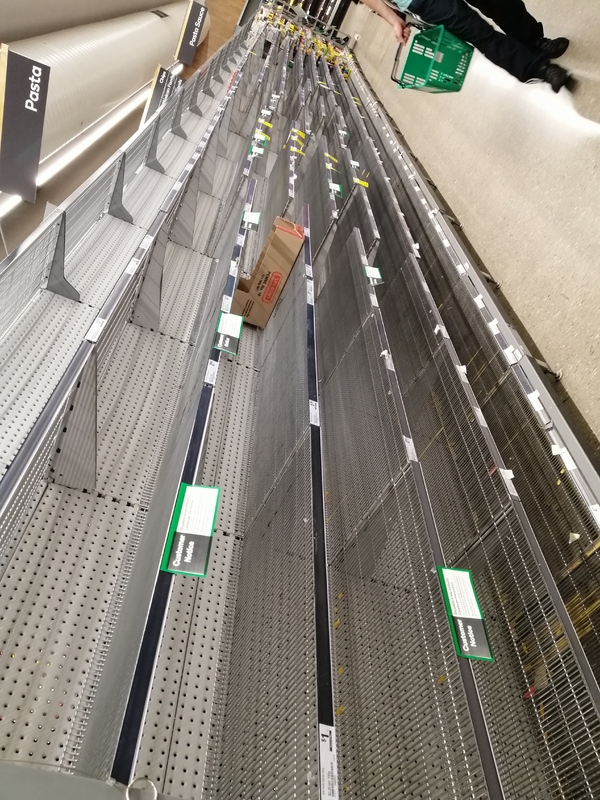
2020-03-17
When Australia first got hit with news of how devastating Covid-19, many people went onto a panic-buying frenzy, stockpiling non-perishable essential items. This is a photo taken at my local Woolworths with the pasta shelves completely gutted. Toilet paper, rice, hand sanitizer, yeast and hand soap were equally cleared out. Some stores went as far as to post signs out the front of their stores stating "NO TOILET PAPER AVAILABLE". As a young person who lives away from home, my regular diet consists of a lot of pasta (also because pasta is delicious). During this time I ended up eating a lot more vegetable soups, because ironically fresh fruit and vegetables supplies weren't particularly affected by the virus or panic buying as they wouldn't last in an impending apocalypse. It took about a month for grocery stores to re-configure their supplies, and the for the panic to die down slightly. When this first happened, the essential items were piled high front and centre at the entrance of the store: I walked in to this same Woolworths one day with a tower of 24-pack toilet pack stacked as tall as I was. This object shows how crowds can react in unexpected and instinctually self-defensive ways when threatened with a large and sweeping danger. HIST30060.
-
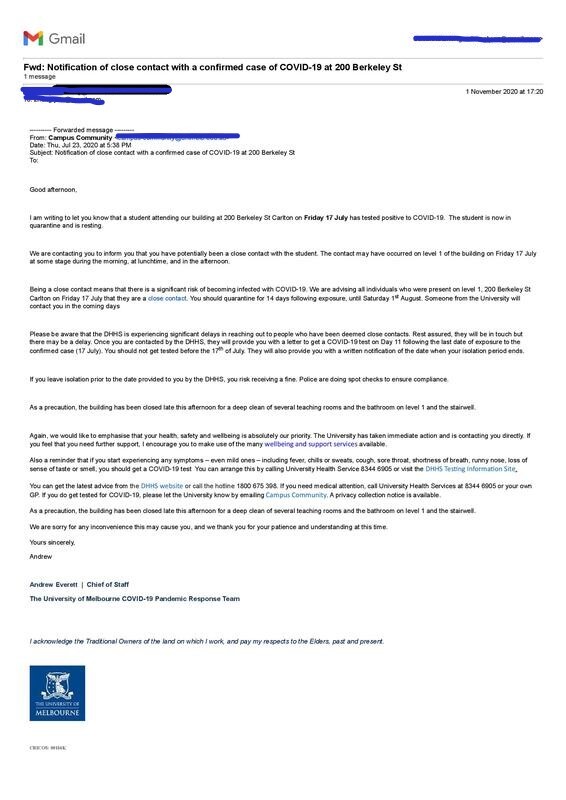
2020-07-23
This was an email sent to my brother, who is a third year Doctor of Optometry student at the University of Melbourne. One of his classmates had tested positive for Covid-19, and he had been in the same lab room doing practicals together during this time. His whole class was asked to self-isolate for a two-week period, and his exams for the semester were pushed back as well. Although he does no directly deal with Covid-19 related patients, as a healthcare worker, he must come in close contact with people on a greater basis than almost any other profession. He isolated for the required period and was tested twice, thankfully with a negative result both times. Each test required 1-2 days turnaround. This object shows the steps organisations are taking to ensure proper contact tracing and in taking care both their patients and students. It also shows how healthcare workers, who come in close physical contact with others, are inherently at high risk and need to be extra careful not to catch or spread diseases. HIST30060.
-
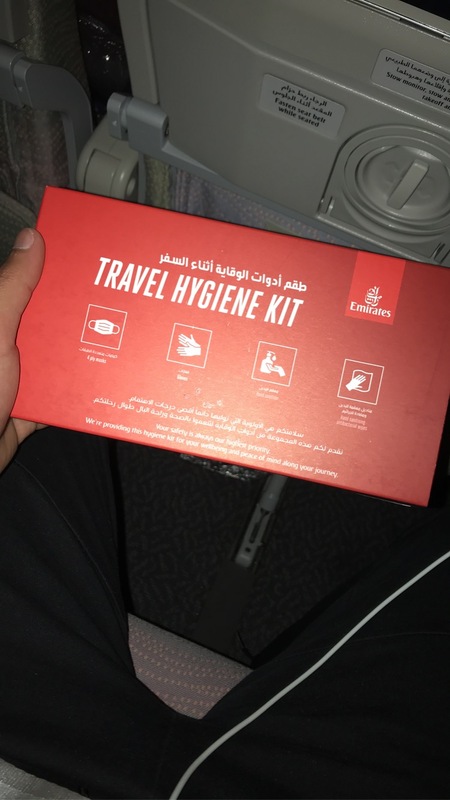
2020-07-15
If you would like to know why I was travelling, please see this journal:
https://covid-19archive.org/s/archive/item/30217
Travelling at the best of times can induce stress and anxiety. In the times of Covid-19, it is a whole different experience.
I am dropped off at Melbourne Tullamarine Airport. The departure screen, usually filled with flight information, now only has a handful of flights on display.
Incoming flights into Melbourne have been suspended entirely.
My destination is Bahrain via Dubai International Airport.
Emirates Airlines EK409 is flying at about a third of its capacity (the Melbourne-Dubai route is, at normal times, a very popular one and flights are usually almost full).
The extra room is welcome, allowing many travellers to lay down and enjoy a little comfort in these uncomfortable times.
Masks as well as gloves are required throughout the flight. A hygiene kit is provided.
I sleep for most of the flight. When I arrive in Dubai, sitting in the terminal building waiting for my connection (which is in 10 hours because of reduced flights frequency), and as a way of passing the time, I join one of my online University classes.
Three months later, in October 2020, when this journal was written, travel is still a very complicated affair. This is the worst crisis to hit the industry since the attacks of September the 11th 2001.
I will not take travel for granted ever again.
This reflection was submitted as part of the HIST30060 Making History project at the University of Melbourne.
-
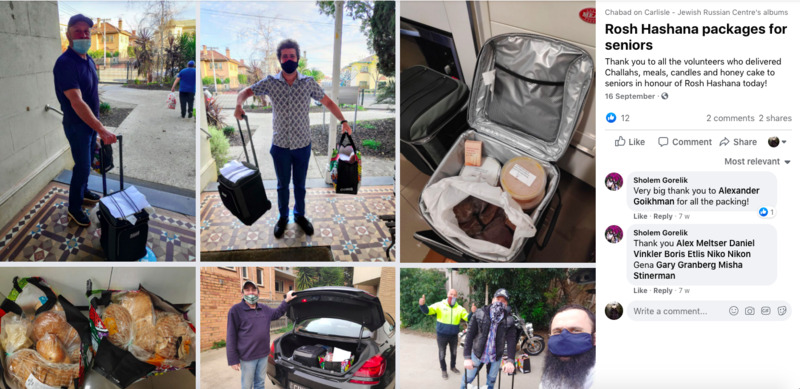
2020-09-16
During Rosh Hashanah Victoria remained in lockdown, and so Chabad on Carlisle - Russian Jewish Centre organised for volunteers to deliver "Challahs, meals, candles and honey cake to seniors in honour of Rosh Hashana".
-
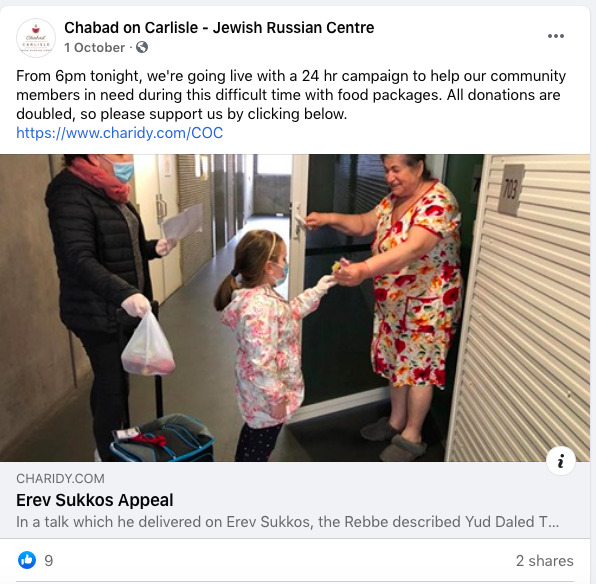
2020-10-01
Chabad on Carlisle - Jewish Russian Centre organised a fundraiser for Sukkos: "In a talk which he delivered on Erev Sukkos, the Rebbe described Yud Daled Tishrei as a day when Jews should literally splurge in giving tzedoka. This year, the call for generosity is so much greater due to the impact of Covid, and the funds you donate will be distributed to alleviate financial hardship and enable the celebration of Succos with true joy and peace of mind."
-

2020-10
Simchat Torah occurred during lockdown, and so Chabad on Carlisle-Jewish Russian Centre provided resources for their community to observe Shemini Atzeret and Simchat Torah at home
-
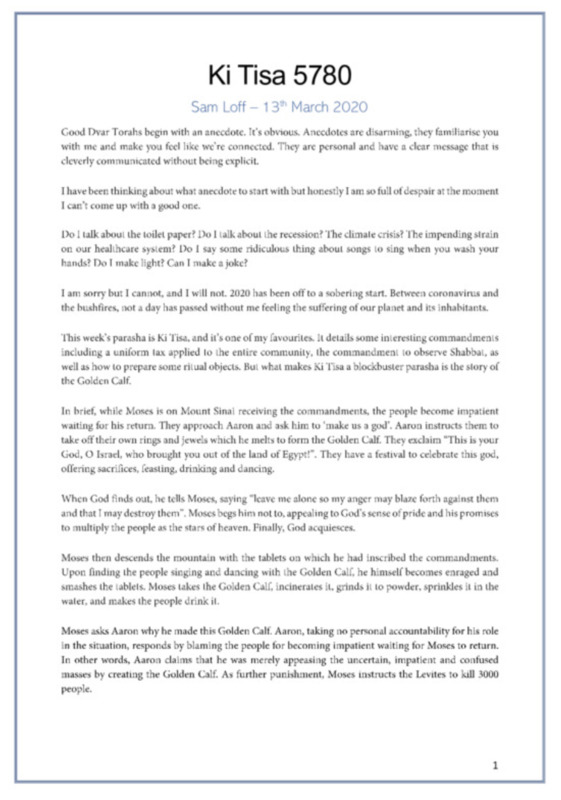
2020-03-13
At the beginning of Victoria's lockdown in March, Sam Loff delivered a drash for parshat Ki Tisa
-
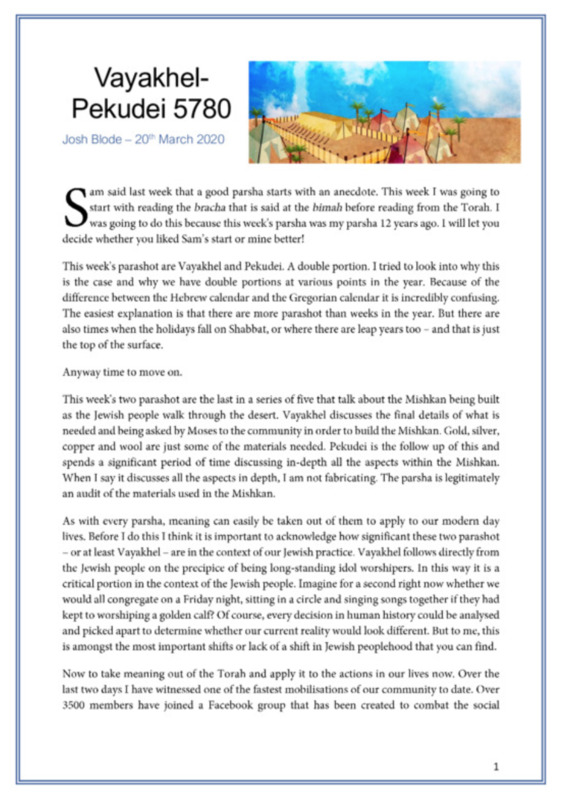
2020-03-20
Melbourne went into lockdown in March, and shortly after, Josh Blode delivered this drash at the shabbat service for Parshat Vayakhel Pekudei
 2020-03-25
2020-03-25 2020-11-10
2020-11-10 2020-05-31
2020-05-31 2020-08-26
2020-08-26 2020-07-30
2020-07-30 2020-08-01
2020-08-01 2020-04
2020-04 2020-05-18
2020-05-18 2020-05-01
2020-05-01 2020-08-09T21:28+10:00
2020-08-09T21:28+10:00 2020-06-30
2020-06-30 2020-08-26
2020-08-26 2020-07-10
2020-07-10 2020-09-26
2020-09-26 2020-09-01
2020-09-01 2020-07-21
2020-07-21 2020-05-12T17:30+10:00
2020-05-12T17:30+10:00 2020-07-05
2020-07-05 2020-08-07
2020-08-07 2020-11-09
2020-11-09 2020-03-23
2020-03-23 2020-10-06
2020-10-06 2020-11-09
2020-11-09 2020-11-09
2020-11-09 2020-04
2020-04 2020
2020 2020-11-08
2020-11-08 2020-07-22
2020-07-22 2020
2020 2020-06-27
2020-06-27 2020
2020 2020-11-09
2020-11-09 2020-10-28
2020-10-28 2020-10
2020-10 2020-09-03
2020-09-03 2020-07-20
2020-07-20 2020-03-13
2020-03-13 2020-07-05
2020-07-05 2020-06-19
2020-06-19 2020-07-16
2020-07-16 2020-03-17
2020-03-17 2020-07-23
2020-07-23 2020-07-15
2020-07-15 2020-09-16
2020-09-16 2020-10-01
2020-10-01 2020-10
2020-10 2020-03-13
2020-03-13 2020-03-20
2020-03-20